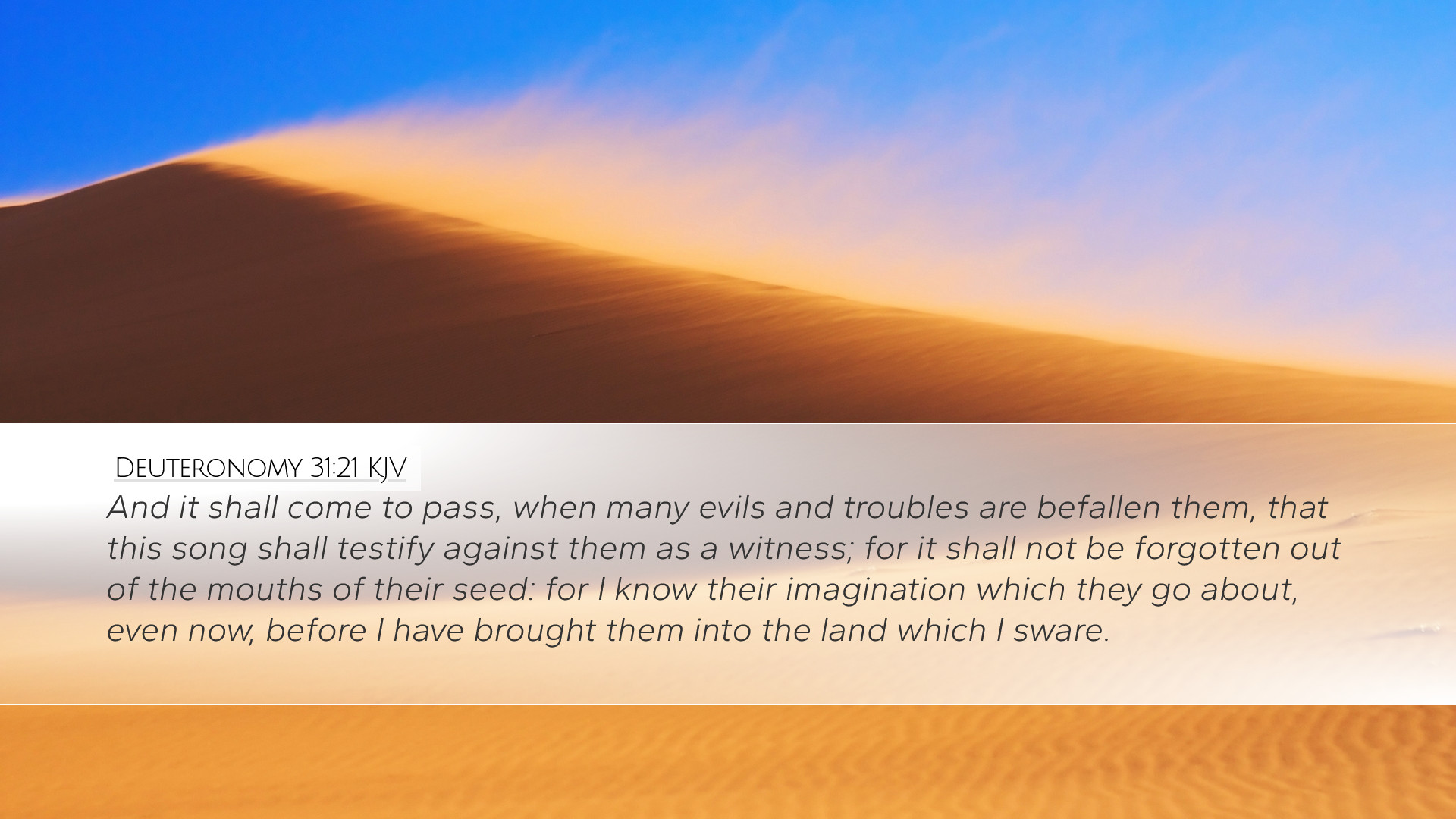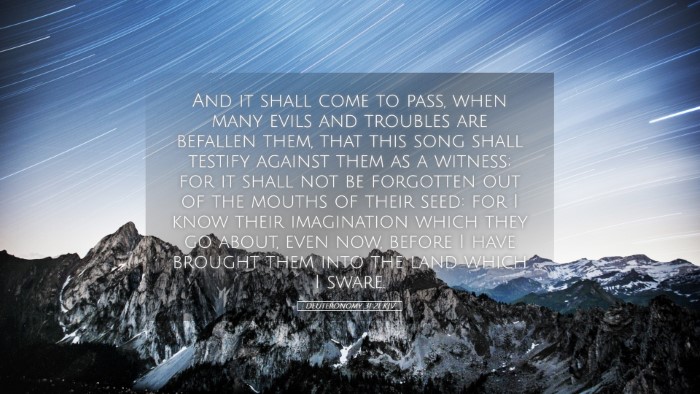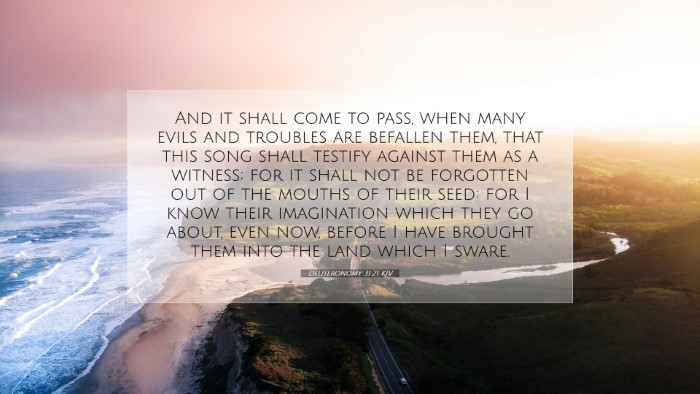Commentary on Deuteronomy 31:21
Bible Verse: Deuteronomy 31:21 - "And it shall come to pass, when many evils and troubles are befallen them, that this song shall testify against them as a witness; for it shall not be forgotten out of the mouths of their seed: for I know their imagination which they go about, even now, before I have brought them into the land which I sware."
Introduction
This verse appears within the larger context of Moses' farewell address to the Israelites, in which he encourages them to remain faithful to God amidst the challenges they would face in the Promised Land. It emphasizes the importance of memory and testimony, framing the role of a song as a means to recall God's faithfulness and warn against the consequences of disobedience.
Insights from Public Domain Commentaries
Matthew Henry’s Commentary
Henry emphasizes the significance of memory and the covenantal relationship between God and Israel. He notes that the song mentioned in the verse serves as a witness and a persistent reminder of the commitments both parties have made. This remembrance is crucial because:
- Witness Against Evil: The song acts as a testimony against the evils Israelites may encounter, suggesting that they will serve as a constant reminder of God’s covenant and the obligations it entails.
- Generational Impact: Henry points out that the song is not just for the current generation but is intended to be passed on to future generations, ensuring that the teachings and warnings remain alive in the culture of God’s people.
Furthermore, he highlights that God has foreknowledge of the people’s inclinations towards disobedience, thus stressing His omniscience and the need for Israel to remain vigilant in their faith.
Albert Barnes’ Notes on the Bible
Barnes provides a historical and theological perspective on this verse. He notes that the "song" refers to the earlier verses in Deuteronomy 32, which holds prophetic significance. His insights include:
- Prophetic Witness: The song foresees the future failures of Israel, serving as a calling to repentance. By predicting the nation's unfaithfulness, it prepares them for possible future judgments.
- Instruction for Posterity: Barnes highlights the educational nature of this verse, where the song is meant to be taught to sons and daughters, thus fostering a lasting reverence for both God’s character and the seriousness of their covenant.
He also mentions that this testimony serves as both hope and warning, an appeal for the Israelites to remain faithful to their deity amidst inevitable challenges.
Adam Clarke’s Commentary
Clarke elucidates the spiritual implications of the verse, urging a deeper understanding of God’s providence and the human heart. His thoughts include:
- Human Imagination: Clarke draws attention to God’s knowledge of the Israelites' tendencies and imaginations, remarking on the inherent sinful nature of humanity. This statement is a reminder of the importance of aligning one’s desires and thoughts with God’s will.
- Importance of Music and Song: He elaborates on the cultural and spiritual importance of songs, noting that they can influence belief, behavior, and memory. This is significant because music is a powerful vehicle for theological truth; it should shape character and faith.
Clarke underlines that remembrance through song can inspire a heartfelt response and a commitment to God’s commands, emphasizing the relational aspect of faith between God and His people.
Theological Implications
The commentary from these scholars brings forth several theological implications worthy of consideration:
- God's Omniscience: The verse showcases God’s foreknowledge and awareness of humanity's predisposition towards sin, which leads to thoughts on God’s grace and mercy in the face of unfaithfulness.
- The Role of Remembrance: The importance placed on remembrance highlights the need for practices that keep the community engaged in their faith—much like how contemporary congregations may use hymns and songs to cultivate a culture of worship.
- Intergenerational Responsibility: The focus on teaching the song to future generations emphasizes the call for believers today to actively pass down the truths of God’s Word to ensure that the faith is not only understood but lived out.
- Covenantal Faithfulness: The continuous theme of faithfulness versus unfaithfulness underlines the significance of the covenant relationship that the Israelites had with God—a theme that resonates deeply in the current understanding of God’s relationship with the church.
Conclusion
Deuteronomy 31:21 serves as a profound reminder of the consequences of forgetting God amid the troubles of life. The integrated insights from Matthew Henry, Albert Barnes, and Adam Clarke converge to provide a multifaceted understanding of the necessity of faithfulness, the power of song, and the accountability of each generation to pass on the truth of God's covenant. For pastors, theologians, and students of Scripture, this verse challenges us to embrace our role in witnessing and preserving God's truths in our communities while pointing others towards the steadfastness of God's character.


